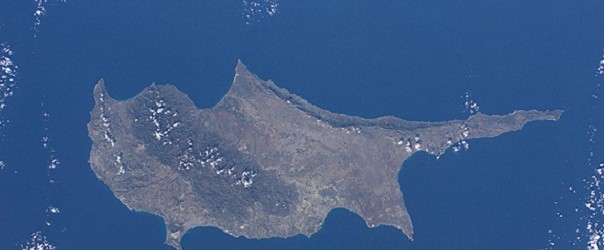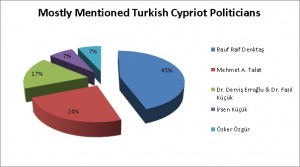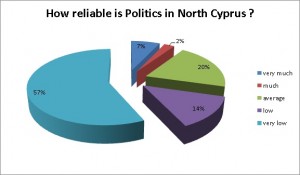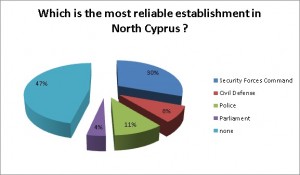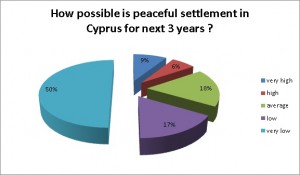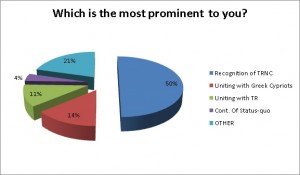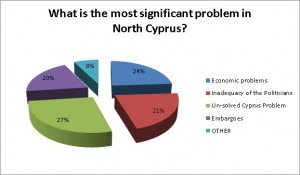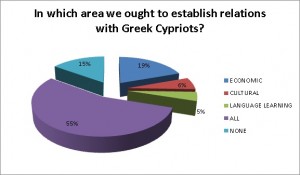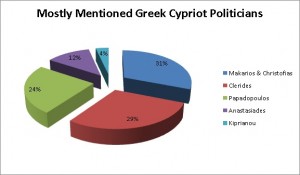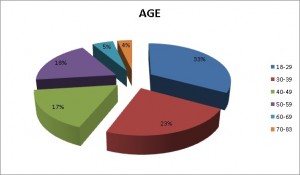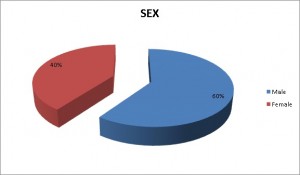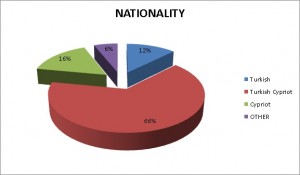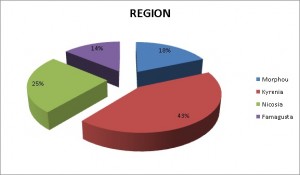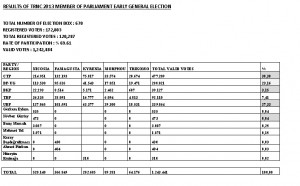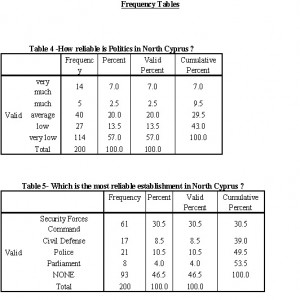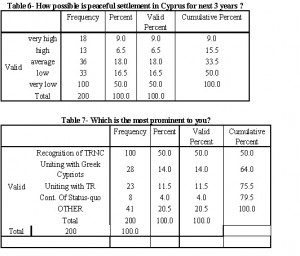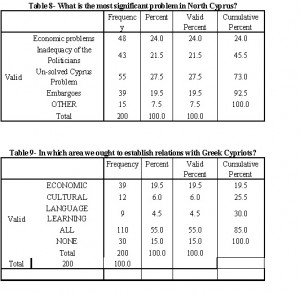CHAPTER I: INTRODUCTION
“Politicians are the same all over. They promise to build a bridge even where there is no river.”[1]
Turkish Republic of North Cyprus, as a micro-state, has many advantages and disadvantages. As a de-facto state, embargos in regards to many productive and sportive fields are deemed worthy to be accounted as a major problem waits to be solved. Since the 1974 Cyprus Peace Operation, issues related to foreign affairs and interior politics have been reformed and extant to be the main topic of discussion in both public and political means. Turkish Cypriot community have two main apart political ideologies. One is producing permanent and sound policies in accordance with Turkish Republic governments and the other is to establish non-bounded recognized state preferably in federal unification with Greek Cypriot community, thus joining European Union as a permanent member.
1.1. Hypothesis & Research Questions
This research concentrates on the reliability of Turkish Cypriot politics and the recognition of Turkish Cypriot politicians. Thus, the research paper will produce main ideas in regards to political perspectives and ideologies of Turkish Cypriot community in most recent date.
Main hypothesis of the research is that Turkish Cypriot politics are not reliable enough in the eyes of Turkish Cypriots and the recognition of Turkish Cypriot politicians by Turkish Cypriot community is to be focused on fewer and specific names than many.
1.2. Methodology
During the research the method used consisted of providing questionnaires, holding 8 questions in total and 7 demographic questions, to randomly selected 200 correspondents all around North Cyprus including four main cities (Famagusta, Kyrenia, Nicosia and Morphou) also town and villages bounded to thereof. Age, profession/occupation and education level of the correspondents are varied in large scale and furthermore, female and male ratios are merely equal in numbers.
1.3. Limitations
Due date for the research paper to be collected unfortunately limited the time for the research as it was part of a summer course (MGMT 500 – Research Methods). Time limitation therefore was unavoidable. Other limitations faced during the research phase were non-collaborative attitudes of the candidate correspondents. Correspondents often abstained as North Cyprus is on the eve of immediate elections. Final limitation countered during the research and collecting data via questionnaires was due my personal time limitation as I work full time in GAU (Girne American University).
1.4. Literature Review
Similar articles, even though not perfectly same, can be obtained through online articles or books previously published. As reviewing, nevertheless not many, I have come across only single online article.[2]
CHAPTER II: POLITICAL ANALYSIS
2.1. Political History
Cyprus was under the authority of United Kingdom in 1878 as a result of the Cyprus Convention. The island was governed by United Kingdom as it was regarded as protectorate from the Ottoman Empire. During the beginning of World War I in 1914 Cyprus was annexed to United Kingdom and following the years in 1925 Cyprus was made a Crown Colony.
In 1955-56 EOKA was formed by Greek Cypriots under the leadership of George Grivas to undertake “enosis” (union of the island with Greece). Despite this attempt, the political events had resulted in an independent federal republic of Turkish and Greek Cypriots, The Republic of Cyprus in 1960.
Since the early hours of 20th of July 1974 with the Cyprus Peace Operation of the Turkish Army which departed from the Turkish mainland to undermine the Greek “junta” (military coup) in Cyprus, Turkish Cypriot politics have had begun to mould into a state by the date 15th of November 1983 under the name of Turkish Republic of Northern Cyprus (TRNC).[3] Since then, TRNC has relied on funds of Turkish governments to support the turnover of the state. Peace talks and negotiation meetings had been held since with the Greek Cypriots within the right of Turkey, Greece and England to guarantee (accordingly to Zürich, 19 February 1959)[4] and furthermore unofficially of USA.
2.2. Political Parties and Politicians of TRNC
There are six political parties; UBP (National Unity Party), CTP-BG (Turkish Republican Party-United Powers), DP-UG (Democrat Party-National Powers), TDP (Communal Democracy Party), BKP-TVG (United Cyprus Party- Communal Existence Powers) and YKP (New Cyprus Party). The party leaders are listed respectively:
1- İrsen Küçük- (UBP)
2- Özkan Yorgancıoğlu- (CTP-BG)
3- Serdar Denktaş- (DP-UG)
4- Mehmet Çakıcı- (TDP)
5- İzzet İzcan- (BKP-TVG)
6- Murat Kanatlı (General Secretary)- (YKP)[5]
The current Ministers of the ad-hoc technocrat government in power are:
1. Dr. Sibel Siber – Prime Minister
2. Atay Ahmet Raşit – Minister of Economy and Energy
3. Kutlay Erk – Minister of Foreign Affairs
4. Zeren Mungan – Minister of Finance
5. Aziz Gürpınar – Minister of Labour and Social Security
6. Dr. İsmail Başarır – Minister of Public Works and Transportation
7. Dr. Nuri Gökşin – Minister of Health
8. Gülsün Yücel – Minister of Interior
9. Mehmet Harmancı – Minister of Tourism, Environment and Culture
10. Asım İdris – Minister of National Education, Youth and Sports
11. Sami Dayıoğlu – Minister of Agriculture and Natural Reserves
The current President of Turkish Republic of Northern Cyprus is Dr. Derviş Eroğlu.
2.3. Recent Political Developments
On 24th of April 2004, Cyprus Annan Plan referendum[6] was held among the Turkish Cypriot community in Turkish Republic of Northern Cyprus and Greek Cypriot Community in Republic of Cyprus. The Plan was approved by 64.91 % of Turkish Cypriots while 75.83 % % of the Greek Cypriots had rejected. The turnout for the referendum was high while 89 % of Turkish Cypriots and 87 % of Greek Cypriots had participated for the future of Cyprus.
Turkish Republic of Northern Cyprus is into a new political phase with the early elections[7] to be held on 28th of July 2013. Turkish Cypriots Community has new expectations in means of foreign and interior politics of North Cyprus. Political parties have distributed their political manifestos to the public which all propose covenants in regards to better future.
The elections will be participated by UBP (National Unity Party), CTP-BG (Turkish Republican Party-United Powers), DP-UG (Democrat Party-National Powers), TDP (Communal Democracy Party), BKP-TVG (United Cyprus Party- Communal Existence Powers), YKP (New Cyprus Party)[8] and Independents.
Turkish Republic of Northern Cyprus is currently been governed by an ad-hoc technocrat government[9] under the Prime Ministry of Sibel Siber[10]; the first female Prime Minister of TRNC.
2.4. Analysis
As first question stated:
“Name the Turkish Cypriot politicians whom you recognize at once.”[11]
The empirical method of questioning the random samples has provided results which includes certain Turkish Cypriot names which have been recognized by the majority of the samples been questioned.
As it has been previously stated in the hypothesis even though there are many politicians in Turkish Republic of Northern Cyprus only few of those have been recognized by 200 correspondents at once. This confirms that only those fewer individuals whom had been recognized have really registered to the communal events and caused serious impact to the Turkish Cypriot community nevertheless their political sides.
Furthermore, the named recognized politicians are not necessarily alive at present. There are those whom have been mentioned that have passed away either recently or many years ago.
This results and data also imply that politicians whom have not been mentioned or mentioned only by fewer correspondents have had less impact to the Turkish Cypriot community in means of their actions during either in their periods of power or opposition.
During the completion of the questionnaires through random individuals, there has been an incident which the correspondents resembled unease when answering the first question. Most of the correspondents usually stated that there are no actual politicians which whom they can mention.
Statistics further evaluates that following political names below had been mentioned utmost by the correspondents. (Note: Following names are only those names which had been recognized by the majority of the correspondent by first thought. This does not necessarily mean that these names are favoured or not favoured by the correspondents).
1. Rauf Raif Denktaş: 124
2. Mehmet Ali Talat: 68
3. Dr. Derviş Erroğlu & Dr. Fazıl Küçük: 47
4. İrsen Küçük: 20
5. Özker Özgür: 19
Although Dr. Siber Siber was well reputed recently as the first female Prime Minister of TRNC, she was only mentioned 5 times while individuals like Dr. Ahmet Kaşif (Former MP of UBP recently DP-UG) and Ejder Aslanbaba (Former member of DP-UG recently independent) nevertheless caused significant sensation in the Turkish Cypriot politics through uncorroborated cases of subornation have only been mentioned once[i] each.
Second question read as follows;
“How reliable is politics in North Cyprus?”[12]
The statistics reveal that 114 of 200 correspondents do not believe that politics in North Cyprus is reliable. The 57 % of the correspondents whom chosen to mark “very low” in the questionnaire, have mostly asked for extra option such as “not” as they (correspondents) have in majority argued that Turkish Cypriot politics is not any reliable.
Mostly face to face completed questionnaires confirm that Turkish Cypriot community has lost their hopes upon politics and politicians. Many correspondents have stated that each party wheather rightst or leftist are all same. They promise before the elections but never implement what they have promised after they be into the power.
The cummilated percentage of “low” and “very low” is 70.5 %. This is 141 correspondents in total of 200 whom chose to mark that Turkish Cypriot politics is not sufficiently reliable.
As it has been stated in the hypothesis, the statistics also evaluate that Turkish Cypriot politics is not reliable.
Furthermore the third question is relevant to be combined with the reliability of Turkish Cypriot politics as it refers to;
“Which is the most reliable establishment in North Cyprus?”[13]
Nevertheless politics in North Cyprus is not reliable accordingly to the results gained via statistics in line with 200 random correspondents, the core establishments of a state like National Security Command, Civil Defense, Police and Parliament are found less reliable as “none” was marked 93 times by 200 correspondents which equals to 46.5 % of the total.
Even though North Cyprus is a democratic law state based on national constitution, Turkish Cypriot community are more reluctant to envy an armed institution (National Security Command) rather than the Parliament. This also proves the lack of reliability to the politicians by the community. Armed forces like army and police have both cumulated more percentage each than the Parliament.[14]
- Police: 10.5 %
- National Security Command: 30.5 %
- Whereas Parliament only: 4.0 %
On the other hand Civil Defence also reached higher percentage in reliability by achieving 8.5% in total.
Reliability is indeed significant for the country which voted 65 % “YES” for the Annan Plan in 2004 but unfortunately faced disappointment due to the foreign political interruptions and embargos against the Turkish Cypriot Community and blocked the possibility for its membership to European Union. Accordingly to this concern, the fourth question in the questionnaire has asked the correspondents the possibility of peaceful settlement as:
“How possible is peaceful settlement in Cyprus for next 3 years ?”[15]
The results are somehow interesting and expected. From 200 correspondent 100, meaning 50 %, have stated that the possibility of peaceful settlement in Cyprus for the next 3 years is “very low” and as before stated they claimed that if there was a chance for them to choose “none” they would have had. Those whom also stated that the possibility is “low” were also 16.5 % and this cumulates to 65.5 % of “low” and “very low” possibility of peaceful settlement in Cyprus for the next 3 years. This is nearly and even more the percentage of “YES” vote from those same Cypriot Turkish people whom have accepted the Cyprus Annan Plan in 2004. Only 6.5 % of the correspondent marked “high” and 9 % have marked “very high” possibility of peaceful settlement in Cyprus for the next 3 years; this in total cumulates to 15.5 % which merely the same number that voted “NO” for the Annan Plan from Turkish Republic of Northern Cyprus.
Through the off the record interviews with the correspondents, it reveals that majority of the Turkish Cypriot Community whom are pessimist about the peaceful settlement in Cyprus are nevertheless in favour of a peaceful settlement. This will be further discussed in upcoming analysis of the questions and responses.
Further analysis is about the fifth question which was directed to correspondents as follows:
“Which is the most prominent to you?”[16]
11.5 % of the correspondent has chosen to “Unite with Turkish Republic” nevertheless the possibility of losing their Cypriot identity. Counter to this 14.5% of the correspondent have chosen to “Unite with Greek Cypriots” nevertheless the possibility of losing their Turkish Cypriot identity. 8 % of the correspondents argued that continuation of the status-quo is the most advantaged for the Turkish Cypriot community; this reveals those who seek no settlement in Cyprus. 50 % of the correspondents have argued the most favourable attempt would be the “Recognition of TRNC” while 20.5 % have marked “OTHER” category and stating that they favour federation as a resolution for the Cyprus problem.
Those who chosen the “Recognition of TRNC” have actually stated that they seek a resolution to Cyprus problem through federation. In this sense “OTHER” category and “Recognition of TRNC” both cumulate to 70.5 % in total for federation based resolution for the Cyprus problem. This further evaluates that more than 5 % of those who accepted the Cyprus Annan Plan (65 %) are in favour of federation based peaceful settlement in 2013 after 9 years of the proposal of the Annan Plan. Nevertheless the hopes are low; Turkish Cypriot community seeks a fair settlement.
The sixth question in the questionnaire was as below:
“What is the most significant problem in North Cyprus”[17]
Nevertheless results are intimate for one another, Turkish Cypriot correspondents did announce that second most significant problem in North Cyprus is “Economic problems” with 24.0 % and “inadequacy of the politicians”, expectably, is the third most significant problem in North Cyprus with the majority of frequency by 21.5 %. “Un-solved Cyprus problem” holds the lead by 27.5 % further approving the favour for settlement in Cyprus. “Embargoes” is the third runner-up by 19.5 % and “OTHER” category is only 7.5 % of the total.
These statistics reveal that even though Cyprus problem is significant the Turkish Cypriot community is actually more considered with the day-to-day problems which are majorly financial. As aforementioned, the unreliable politicians are also been considered as inadequate. Turkish Cypriot community do expect the experts and technocrats to be in power rather than people with communal popularity.
The seventh question is more about one-to-one relations and communal relations with Greek Cypriots despite any political approach:
“In which area we ought to establish relations with Greek Cypriots?”[18]
This question, nevertheless less political, have evaluated that 110 of 200 correspondents (55 %) do favour interaction with Greek Cypriots in means of “Economy”, “Culture” and “Language Learning”. This can be a reference to a will for a peaceful federation based settlement.
Those correspondents whom favoured no relations with Greek Cypriots showed a frequency of 30 % in total.
Finally the eighth question in the questionnaire referred to the Greek Cypriot politicians:
“Name the Greek Cypriot politicians whom you recognize at once”
This question focused on the Greek Cypriot politicians whom had significant impact on Turkish Cypriot community during their authorities. As a result, mostly mentioned Greek Cypriot politicians’ names are as follows:
1. Makarios & Christofias: 61
2. Clerides: 57
3. Papadopoulos: 48
4. Anastasiades: 24
5. Kiprianou: 7
CHAPTER III: CONCLUSION
3.1. Outcome
As to conclude, this research has evaluated cumulated data and statistics accordingly to total of 200 correspondents whom were selected randomly which varied from 18 to 83 years of age.
The sex ratios of the correspondents were rated as 120 males and 80 females figuring total of 200.
81.5 % of the correspondents were Turkish Cypriots which 16 % of this amount identified themselves as “Cypriot”. 12.5 % of the total was Turkish nationals and remaining 6% of the total correspondents were nationals of other countries like France and Great Britain in general.
All correspondents were citizens of Turkish Republic of Northern Cyprus as a common specification and were randomly selected from all around North Cyprus including four main cities (Famagusta, Kyrenia, Nicosia and Morphou)[ii][19] also town and villages bounded to thereof.
This research has clarified that Turkish Cypriot community do not consider Turkish Cypriot politicians as reliable and also do not favour reliability on the Parliament.
Turkish Cypriots, despite previous disappointments, are very keen for a peaceful settlement in Cyprus. Turkish Cypriots, as has been statistically proven, are indeed reluctant to unite with Greek Cypriots under a federal base of peaceful settlement.
Nevertheless previous periods under Ottoman rule, Crown Colony authority and later the government of Republic of Cyprus, Turkish Cypriots have always been dominated by the majority and/or the powerful governors. During these periods of cope-mechanism, the Turkish Cypriots always tried to hold on to their identities sometimes as Turkish, Cypriot or now as Turkish Cypriots.
Despite this research is focused on the recognition of Turkish Politicians and Reliability of Turkish Cypriot politics, It is visible during the research phase that Turkish Cypriots are still struggling for their identity to exist and be recognized by the world.
Turkish Cypriots, although very interested in politics, do only recognize fewer politicians despite many other significant names which even caused serious sensation through the Turkish Cypriot politics. This shows that mild politics are easy to forget but contrarily sharp edged politics are more easy to remember and causes permenant impact on the community.
During the completion process of this report, early elections have been eventuated and results have supported the hypothesis recorded prior to the realization of the early elections mentioned in the introduction phase of this report.
The results[20] of the elections concluded as CTP-BG holding the leading number of votes with 38.37 % and UBP managing 27.30 % for a close follow-up. DP-UG, with no suprise, rose in thier total votes to 23.11 % and TDP cumilated to 7.43 % and finally BKP-TVG was not sufficient to place MP with a low total vote rate of 3.21 %. Total participation to the election by the voters was only 69.61 % also this low rate of participation included 18.45 % of karma[iii] votes, twice as much of previous election rates, thus revealing that public no more consider politics as reliable in TRNC and prefering to choose those whom are technocrats of their political activity fields.
Finally, the current political situation according to the number of MP of each political party requires a coalition expected to be formed between CTP-UBP or CTP-DP or DP-UBP. Nevertheless which party formes a colalition the evident and apparent fact is that parties are now aware that the public have not considered the political parties and the political system in TRNC as reliable.
3.2. Recommendations
– Further and more focused results can be obtained if a forementioned limitations are overcomed.
– This research can be more meaningful if also would be conducted after a period of time following the early elections and compared both research results to gain clear view of the altered values.
A broader research can be conducted by sampling more than 1000 correspondants.
Ali ÜNCÜ
TABLES
REFERENCES
– “Quote by Nikita Kruschev”, Brittannica Academic Edition, Retrieved from http://www.goodreads.com/quotes/97934-politicians-are-the-same-all-over-they-promise-to-build on 16.07.2013.
– “Kıbrıs Türk Halkı Aşağılanıyor”, Retrieved from http://www.gsaydam.org/index.php?option=com_content&task=view&id=780&Itemid=1 on 26.07. 2013.
– “Annan Planı Referandumu”, BRTK, Retreived from http://www.brtk.net/index.php?option=com_content&view=article&id=59608:annan-plani- referandumu&catid=1:kktc&Itemid=3 on 26.07. 2013.
– “KKTC’ye İlk Kadın Başbakan”, Uluslararası Politika Akademisi, Retrieved from http://politikaakademisi.org/kktcye-ilk-kadin-basbakan/ on 26.07.2013.
– Örmeci, Ozan (2013), “KKTC’de Zafer Demokrat Sosyal Demokrat CTP’nin”, Uluslararası Politika Akademisi, Retrieved from http://politikaakademisi.org/kktcde-zafer-sosyal-demokrat-ctpnin/ on 29.07.2013.
[1] This famos quotation was said by Nikita Sergeyevich Khrushchev. See; “Quote by Nikita Kruschev”, Brittannica Academic Edition, Retrieved from http://www.goodreads.com/quotes/97934-politicians-are-the-same-all-over-they-promise-to-build on 16.07.2013.
[2] “Kıbrıs Türk Halkı Aşağılanıyor”, Retrieved from http://www.gsaydam.org/index.php?option=com_content&task=view&id=780&Itemid=1 on 26.07. 2013.
[3] TRNC is a “De Facto State” and is only recognized by the Turkish Republic and has no recognition among Member States of the European Union or other Soveriegn States.
[4] Treaties of Allience for Guarrantee was agreed upon by Turkey, England and Greece.
[5] Unofficial leader of YKP is Alpay Durduran.
[6] “Annan Planı Referandumu”, BRTK, Retreived from http://www.brtk.net/index.php?option=com_content&view=article&id=59608:annan-plani- referandumu&catid=1:kktc&Itemid=3 on 26.07. 2013.
[7] Early election was called in line with the decision of three opposition parties (CTP-DP-TDP) of the Parliament and upon the fall of the government by the motion of cencure of 8 MP’s of UBP (former party in power).
[8] YKP has announced boycott for the elections.
[9] Ad-hoc government in power since the upon the fall of the government by the motion of cencure of 8 MP’s of UBP (former party in power).
[10] “KKTC’ye İlk Kadın Başbakan”, Uluslararası Politika Akademisi, Retrieved from http://politikaakademisi.org/kktcye-ilk-kadin-basbakan/ on 26.07.2013.
[11] Pls. See: pp. 13-20/ Table 16
[12] Pls. See: p.7/Table 4.
[13] Ibid, Table 5.
[14] Ibid.
[15] Ibid, Table 6
[16] Pls. See: p.8/Table 7.
[17] Ibid, Table 8.
[18] Ibid, Table 9.
[19] Regional participation ratios can be obtained from page 12 / Table 14.
[20] Örmeci, Ozan (2013), “KKTC’de Zafer Sosyal Demokrat CTP’nin”, Uluslararası Politika Akademisi, Retrieved from http://politikaakademisi.org/kktcde-zafer-sosyal-demokrat-ctpnin/ on 29.07.2013.
[i] Table only provides frequency ratios for the names which had been mentioned two or more times.
[ii] The Turkish corresponding names for the cities are Famagusta-Mağusa, Kyrenia-Girne, Nicosia-Lefkoşa, Morphou-Güzelyurt.
[iii] Candidate MPs are voted individually beside of voting the party as a whole.


